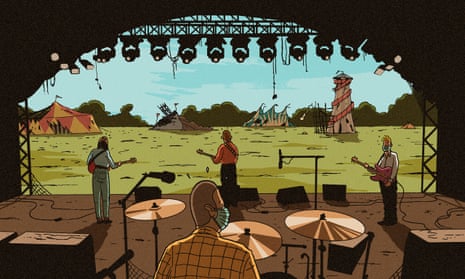Human beings need to regularly gather together. Over the past 15 or so months, the fact that we have largely been deprived of such opportunities has been a key reason why so many people have felt so listless and disoriented – and, for that matter, why some have been driven to break the rules. Obviously, to understand what they have done is not to condone it, but there is something in all those stories of illicit parties and so-called raves that highlights a need for communality and shared pleasure that will always finds cracks to grow in, like weeds on the driest of pavements.
The best example of what we have missed centres on the UK’s outdoor festivals. Amid corporate sponsorship and phone-charging tents, these events may not necessarily look like the modern version of ancient rites involving dancing, singing and feasting (and intoxication), but it is not hard to see them as exactly that. They also highlight what the performing arts bring to the world, and how much people value them. In 2019, 26% of British adults were reckoned to have gone to at least one festival in the past 12 months; before the pandemic struck, the sheer number of British events – from vast mega-festivals to compact local versions – spoke volumes about people’s appetite for them.
But now festivals are in trouble. In 2020, mass gatherings were forbidden. This year, their organisers need insurance to guard against the possibility of Covid-based cancellation, but the pandemic means that the private market will not provide. A government-backed insurance scheme – which is what has been introduced in such European countries as Germany, Denmark, Austria and Sweden – would fill the gap. The Association of Independent Festivals (AIF), which represents the organisers of 90 events, says that this is the one dependable way of not “pushing festival businesses towards another cliff edge”.
But the government says it will not consider anything like that until after the provisional “terminus date” of 19 July. The problem for festivals is that preparation and planning – let alone building a site – stretches over months and often costs millions, and the current question marks hanging over festivals are making such work impossible. When I spoke to festival organisers last week, what was most striking was a picture of huge supply chains – dealing with everything from portable buildings, through security, to food – that have been hanging on for months, and are now reaching a crunch point. The result: the AIF says that over a third of summer festivals with room for more than 5,000 people have already been cancelled, and insiders reckon many more will follow. For the organisations and companies that put festivals on, that will mean a second year without revenue, and in many cases likely collapse.
At the heart of this story are not just standard Treasury attempts at parsimony, but this country’s often awful attitudes to the arts. In the midst of a post-industrial economy, festivals are reckoned to generate an annual £1.76bn, and, along with other live events, bring the Treasury £700m in VAT. But in the government’s standoffishness, one senses the hoary old divide between supposedly high and low culture, and some associated beliefs: that gathering in fields in a spirit of hedonism is somehow not entirely right and proper; and that particularly when it comes to popular culture, the state has little or no role. Remember: thanks to decisions made in Westminster, £860m has been hacked out of local councils’ arts spending since 2010.
Whatever individual ministers think about the so-called creative industries, many of the government’s collective actions now suggest the same mixture of indifference and hostility that characterises the parochial, Brexity milieu from which Boris Johnson and co draw their energy. What the tangle of paperwork and costs wrapped up in life outside the EU means for taking music and theatre to Europe continues to cause creative people no end of worry (the culture secretary’s tweeted announcement that a new trade deal means touring can go on without such obstacles in Norway, Iceland and Liechtenstein didn’t cheer many people up).
When Conservatives and Brexiteers attack the BBC, they may focus on news and current affairs, but many have in mind a wider set of targets that extends well into drama, comedy, documentary and all the rest, and that unhinged drive to somehow find pro-Brexit strains of these things, even when they do not exist. More enlightened Tories should perhaps consider that one of the drawbacks of prosecuting a culture war is that the casualties might soon include culture itself.
As proof of backing for the arts, the government would presumably cite its munificent-looking culture recovery fund, even if that relief effort left actual creative practitioners – musicians, actors, artists – untouched. Now, hundreds of venues and organisations complain that chunks of that money have still to arrive, and a failure to continue such help after the delay to reopening is making their position even more fragile: London theatre insiders, for example, claim they are now “on the brink”.
The long-term future, meanwhile, hardly looks any cheerier. Between 2010 and 2018, A-level entries for dance fell by 42%, drama by 33% and music by 38%. Now, the education secretary, Gavin Williamson, and the newly created Office for Students have floated plans to drastically cut government funding for university courses in the same subjects, apparently because these are not considered “strategic priorities”. Here, it seems, is the practical application of the government adverts that briefly ran in 2020, featuring a picture of a ballet dancer and the deathly words “Fatima’s next job could be in cyber (she just doesn’t know it yet)”. She probably does now.
This summer and every summer that follows it, I would really like to stand in a crowded field, and immerse myself in music. Other people will want to go to the theatre, or the recital hall, and take in plays, concertos, operas and the other kinds of creations that also lift us out of ourselves. These things need to be carefully cultivated; if they are to survive into the coming decades, someone in power will have to drastically revise what this country’s “strategic priorities” should be. To idly neglect that point would be bad enough. To do so because musicians, actors and festival-goers do not fit into a crabby, introverted vision of this country’s future would be nothing less than dreadful, in the truest sense of the word.
John Harris is a Guardian columnist

